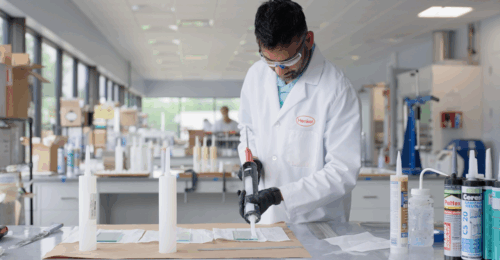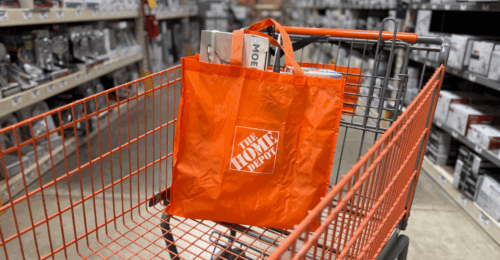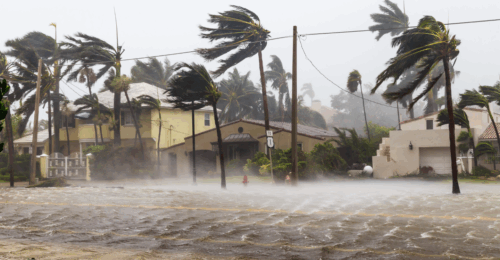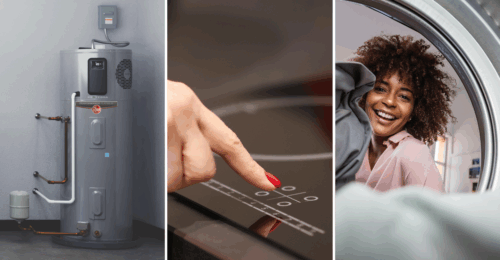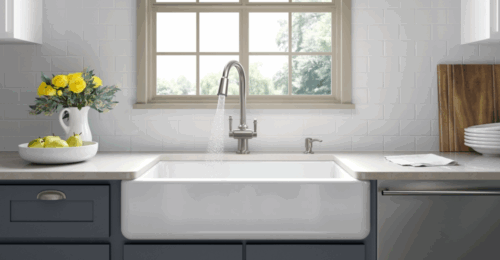When it comes to practicing conservation at home, turning off the tap is a simple step that can have a big impact. Using less water not only saves water, but it can also benefit your household budget by lowering your bill. But turning off the tap is only the beginning.
Today’s kitchen faucets, bath faucets and showerheads are designed to help save water, even when the tap is on. To learn more about these new kitchen and bath products and other eco-friendly innovations in the product pipeline, we’ve invited Meghan Chio, The Home Depot’s Merchant for Faucets, to Eco Actions. Meghan has plenty of insights and actions to share, and the benefits extend well beyond saving water.
EA: Welcome to Eco Actions, Meghan. For people who don’t know what a merchant at The Home Depot does, can you please describe your role?
MC: I think of the merchant role as doing three primary things. Number one, you are the strategic leader of the business. In my case, that business is Decorative Plumbing, which includes all of the decorative metal faucets and fixtures in your bathroom, as well as kitchen faucets. I have a team that works with me, and a counterpart who oversees the online business.
When I speak of leading the business, that includes ensuring that we have innovations that are relevant to the customer, that our products are priced right and that our assortments align with where our customers are shopping. It also includes being on top of any big shifts in the business, such as preparing for new regulations that impact our business.
The second thing we are responsible for is taking care of our stores. As the strategic leader of a category, we must know our customers. One of the ways that we learn about our customers is by spending a lot of time in stores. Merchants try to respond right away to any questions that our stores have whether it’s about the product assortment, an inventory need or a space issue.
Finally, merchants are responsible for delivering the financial results of the business.
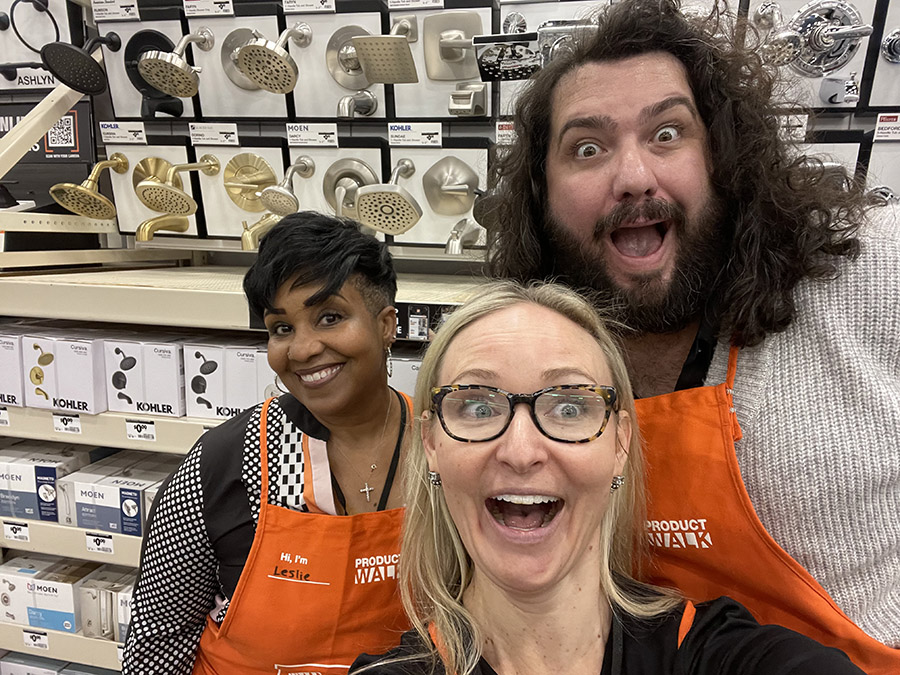
EA: Given that you interact with shoppers frequently, what can you tell us about their main concerns? Is water conservation a priority for shoppers?
MC: The first thing that people typically say when shopping for a faucet is, “I want a faucet that looks like this.” They want a certain look, such as brushed nickel, black or brushed gold. Next, they want a certain style, such as modern, traditional or transitional. After they narrow down the aesthetics, then they focus on price point, or value.
As shoppers begin to contemplate value, then the subject of water conservation comes up. Shoppers care about functionality, and that includes how well a product supports water efficiency. When you’re shopping in The Home Depot for faucets, water conservation doesn’t have to be as high on your radar. We try to make it standard so that customers don’t even have to think about. In fact, all the bath and tub faucets and showerheads sold in stores are WaterSense-approved, which means shoppers don’t have to think about water conservation when weighing their options.
Although pros and contractors aren’t responsible for the water bill, water conservation can still be part of their decision process. A lot of new construction has specifications for high-efficiency products.
EA: We know that merchants spend a lot of time working with suppliers to ensure there are plenty of new developments in the product pipeline. So, what are you seeing when it comes to innovations that support sustainability?
MC: We are incredibly proud of the suppliers that work with us. They bring innovative features and great value that we pass along to our customers. We spend a lot of time working with suppliers to understand their consumer research and how that translates to their innovation pipeline. What new products are you developing? Which customers will that be the best fit for? When will it be ready for stores and homedepot.com? That certainly includes products that help save water in a variety of ways.
Here’s a great example: Several of our suppliers are making Smart Leak Detectors. They use sensors that you place in high-risk areas of your home, such as around your toilet or near your dishwasher or hot water heater. The sensor detects moisture and sends alerts to a mobile app to notify you as soon as a leak happens. By catching leaks as soon as they happen, these sensors not only minimize water waste, but also help prevent or minimize physical damage to your house. This Smart Water Leak Detector includes an automatic shut-off valve that activates when a leak is detected.
We’re also seeing more Smart Showers becoming more mainstream. These showers provide a personalized shower experience and allow you to control your shower remotely, including starting, pausing and stopping your shower. If you think about the amount of water most people waste getting their shower to the right temperature, these Smart Showers minimize that waste. They will turn your shower off once it reaches the desired temperature so that you’re not wasting water. And they will tell you when it’s ready.
EA: It’s great that suppliers are working to make products that support sustainability since we know that it all starts at home. With that in mind, what are suppliers in your category doing to improve their own sustainability?
MC: Our suppliers are being very proactive about many issues, especially carbon emissions. As they think about developing new manufacturing facilities and distribution centers, many suppliers are adopting renewable energy such as solar panels. They are also optimizing existing product flow. At the macro level, we work together to optimize package size and truck configuration so that we reduce the total number of trucks on the road. Our suppliers also think about shipping at a granular level, thinking about how to better protect products in transit so that there’s less damage and waste.
Circularity is another interesting topic. We’re hearing about ocean plastics a lot as companies look for ways to help clean up the oceans by repurposing ocean plastics. Moen’s Mission Moen is a great story here. They’ve made a commitment to repurpose 2,000 pounds of ocean plastics by 2030. And here’s the cool thing: Moen is repurposing ocean plastics into the parts that go into the faucets we sell at The Home Depot.
Personally, I’m also really excited about the new products we’re seeing that offer filtration. We now sell products that have a filter built into the kitchen faucet. They feature a dedicated hose to keep the filtered water separate from the tap water but without needing a separate faucet for filtered water. Think about it: When the water that comes out of your faucet tastes better, people become less reliant on bottled water. It’s a huge win for homeowners who gain a convenient, great tasting water supply straight from their kitchen faucet. Kraus, which is part of the Delta family, has added this technology to their bestselling Bolden faucet.

